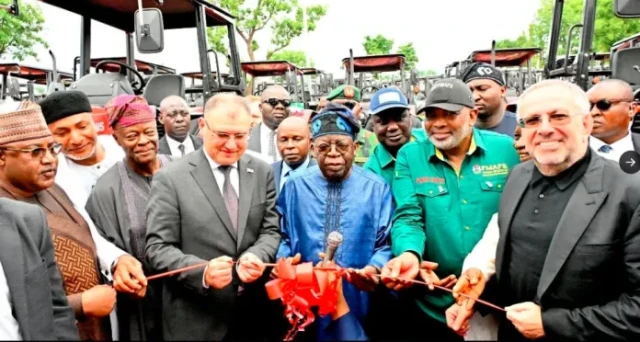In a bid to combat food insecurity and encourage youth participation in farming, President Bola Tinubu has pledged to provide modern tools and structured service support for young farmers across the country.
The initiative is designed to replace outdated practices with technology-driven farming that enhances productivity and reduces manual labour.
As part of efforts to actualize this vision, Tinubu on Monday, declared the start of Nigeria’s agricultural revival as he commissioned 2,000 tractors for nationwide deployment under the Renewed Hope Agricultural Mechanisation Programme.
The commissioning, held at the National Agricultural Seeds Council along the Abuja–Lokoja Expressway, Abuja, marked the official launch of the programme.
Speaking at the event, President Tinubu reaffirmed his administration’s commitment to transforming Nigeria’s agricultural sector through innovation, with the goal of ensuring long-term food security.
He described the launch as a major step toward empowering farmers and revitalizing rural communities.
“We are very proud of what we are doing. We made a promise when we came in. We are fulfilling that promise. Two years ago, I sounded the alarm on our nation’s food security crisis. I demanded immediate and innovative solutions. That, again, is answered today, this is the first phase of it.
“This government recognises that agricultural productivity is synonymous with national stability and food sovereignty. The ability to nourish our population forms the bedrock of a prosperous nation. Our ambition extends beyond self-sufficiency.
“We envision Nigeria as a global agricultural powerhouse, supplying quality produce to international markets while ensuring every citizen can access affordable, nutritious food,” Tinubu added.
To achieve this, he said the administration launched the mechanisation programme, which is still in its early stages.
The 2,000 tractors and accompanying implements, he added, will be distributed through a service-provider model to support smallholder farmers, improve access to modern equipment, reduce physical labour, and boost harvests.
“We must seize this opportunity to achieve agricultural independence. Nigeria has the land, the people, and the tools. Let history recall this day as the beginning of Nigeria’s agricultural renaissance, where modern technology met our farmers’ legendary resilience to usher in greater prosperity.”
The President acknowledged the contribution of international partners, particularly the Republic of Belarus, which played a central role in providing the equipment, technology transfer, and training for Nigerian beneficiaries.
He specifically recognised Alex Sigman, a Belarusian businessman and former classmate at the University of Chicago, for facilitating the partnership.
“Alex was my very good neighbour and schoolmate in Chicago. Never did we dream that I would become President of the Federal Republic of Nigeria and Alex, a successful businessman from Belarus, working together to promote the prosperity of our two countries.
“I believe our university will be very proud that we are doing this here today,” he said.
Commending the Federal Ministry of Agriculture and Food Security for leading the rollout, Tinubu urged accountability and proper use of the equipment.
“To all stakeholders receiving this equipment, deploy it with maximum efficiency. We will work with you, supervise you, and hold you accountable,” he stated.
Tinubu also called on Nigerians to take full ownership of the agricultural transformation agenda and support national efforts to attain food sovereignty.
The Minister of Agriculture and Food Security, Abubakar Kyari, in his remarks, recalled the president’s declaration of a state of emergency on food security in July 2023 and the directive to find urgent, innovative solutions.
He said mechanisation is a cornerstone of the Renewed Hope Agenda and outlined four initiatives under the policy: the John Deere Tractorisation Programme, the Greener Hope Project, the Green Imperative Programme, and the newly launched tractor deployment in partnership with Belarus.
According to him, the Belarus Project—implemented with AfTrade DMCC and supported by the Belarusian government—delivered 2,000 high-quality tractors, 10 combine harvesters, 12 mobile workshops, 9,000 implements, and 9,000 spare part kits.
“Never in Nigeria’s history have we witnessed an agricultural mechanisation initiative of this scale, ambition, and national focus. We are today unveiling the single largest mechanisation drive ever undertaken in our country,” Kyari said.
He added that the programme is projected to cultivate over 550,000 hectares of farmland, produce more than 2 million metric tons of staple crops, create 16,000+ jobs, and directly benefit over 550,000 farming households.
Additional features of the programme include mandatory operator training, GPS tracking for equipment accountability, a structured repayment system, and pro bono allocations to agricultural research and training institutions.
Kyari also highlighted new opportunities for youth employment in machinery operation, maintenance, logistics, extension services, and agri-tech innovation.
Speaking on behalf of Belarusian President Alexander Lukashenko, Deputy Prime Minister Viktor Karankevich congratulated Nigeria on initiating a timely and strategic intervention for national food security.
He commended Nigeria’s decision to partner with Belarus, citing the global reputation of Belarusian agricultural machinery for durability, affordability, and performance.
Karankevich noted that both countries signed a roadmap agreement during the 2024 Belagro Exhibition in Minsk, establishing the foundation for long-term mechanisation cooperation.
“Today, Belarusian machinery begins to serve the people of Nigeria. This marks the first phase of a landmark bilateral project that has already elevated our cooperation to a new level.
He confirmed Belarus readiness to proceed with the next phases of the programme, which include setting up service and maintenance centres in Nigeria, establishing local assembly plants, building grain storage complexes, and training Nigerians in the use of advanced machinery.
“Agricultural mechanisation is just one example of our cooperation. It confirms the immense potential of Belarus–Nigeria relations, grounded in friendship, equality, mutual respect, and trust.
“We come to Africa as friends. We are ready to help you become masters of your land, to benefit your people, and to develop your industry, agriculture, science, and technology,” he added, quoting President Lukashenko.
Finally, Karankevich presented a personal letter and an official invitation from President Lukashenko, inviting President Tinubu to visit Belarus in the near future.




















